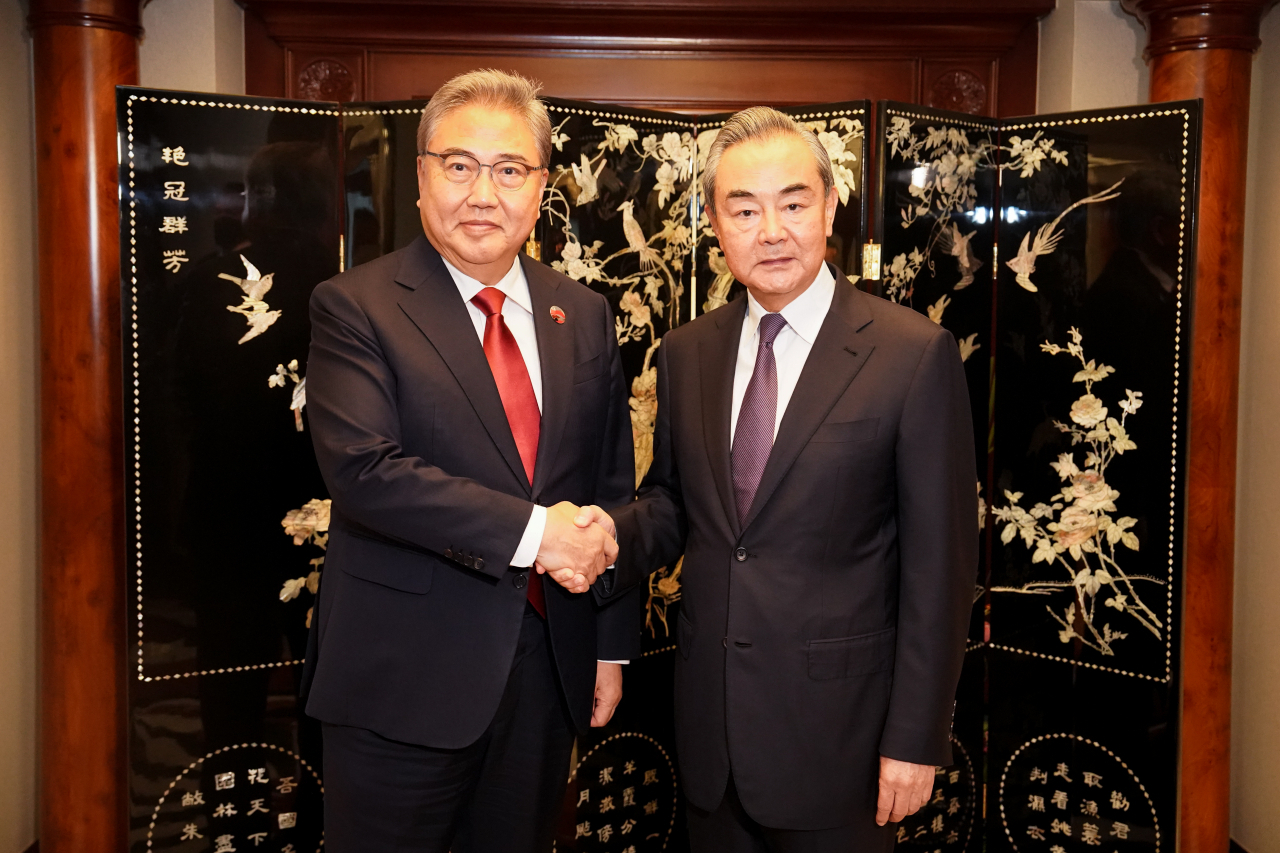 |
Foreign Minister Park Jin (left) and China’s top diplomat Wang Yi at the ASEAN Regional Forum in Jakarta, Indonesia on Friday. (Ministry of Foreign Affairs) |
South Korea and China should use this year’s three-way summit with Japan as momentum to reshape their somewhat rocky ties, experts said Sunday following the Association of Southeast Asian Nations Regional Forum, Asia’s biggest security gathering attended by foreign ministers in the region.
Talks held on the sidelines of the two-day forum that ended Friday between South Korean Foreign Minister Park Jin and Wang Yi, China’s top diplomat, came at a time when Seoul and Beijing were at odds over Korea’s efforts to hew closer to the US amid its intensifying rivalry with China. Wang, foreign policy chief for the Chinese Communist Party, outranks Foreign Minister Qin Gang, who cited health reasons for his absence.
Stressing deepening ties, the dialogue left out details over how to bring about such a lasting thaw, though the high-level engagement itself eased resurfacing tension, experts said.
“And we start building on that in the run-up to the potential three-way summit,” said Kang Jun-young, a professor of Chinese studies at Hankuk University of Foreign Studies and the director of Hankuk University’s Center for International Area Studies.
Kang was referring to talks involving South Korea, China and Japan, a regular meeting suspended over the COVID-19 pandemic in 2019. As this year’s host, Seoul is pushing for a resumption of the talks before the end of the year. The dialogue usually centers on economic ties.
“China has all the more reason to take part in the event now that Korea is not only closer to the US but also Japan. It’s in Beijing’s interest to put the brakes on that,” Kang said, noting Seoul in the meantime could work to reel in Beijing to discuss economic ties, a less sensitive topic for the three countries to engage in for cooperation.
Hwang Jae-ho, a professor of international studies at the Hankuk University of Foreign Studies, said the Yoon administration should step up efforts to reopen the talks, though he described the meeting as “still uncertain” because Seoul-Beijing ties are affected by how China’s relations with the US pan out.
Last week, US Treasury Secretary Janet Yellen met with senior officials in Beijing to ease tensions, the latest meeting between the two superpowers where Washington “aired significant disagreement” according to Yellen. China’s Finance Ministry called on the US to take “practical action” in response to its concerns about sanctions on Chinese firms.
“Korea will have to look at how Washington-Beijing ties evolve. Seoul has limited resources to reshape its relations with Beijing on its own,” Hwang said.
Meanwhile, Chung Jae-hung, director of the Center for Chinese Studies at the Sejong Institute, warned of “no resumption at all,” referring to the three-way dialogue.
“China doesn’t have ‘all the more reason’ to take part in a meeting where Seoul and Tokyo, the two US allies, are closer than ever,” Chung said. “Beijing doesn’t want a part in an event that could potentially endorse the US-led reshaping of the region.”
Further, China is still upset over how Korea has maintained its position over Taiwan and the US-led chip alliance, Chung added, saying that unless Seoul reverses opposing changing the status quo on the self-ruled democratic island China claims as its own and compromises on the chip alliance, China will not easily give into what Korea hopes to achieve.
Hosted by Indonesia this year, the annual regional forum is a rare chance for not only the 10-member ASEAN nations, but also the 27-member European Union as well as the US, Russia and India to discuss security and economic policy.







![[Weekender] Korea's traditional sauce culture gains global recognition](http://res.heraldm.com/phpwas/restmb_idxmake.php?idx=644&simg=/content/image/2024/11/21/20241121050153_0.jpg)